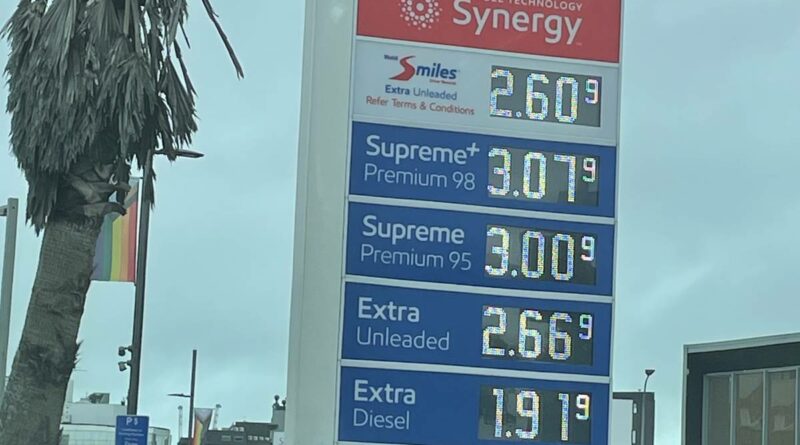Fuel pump prices top $3 at Ponsonby, Auckland Mobil petrol station
Pump pain just got real for motorists, with unleaded 95 fuel cracking $3 a litre in Auckland today.
A motorist snapped a picture of prices at a central Auckland Mobil, showing premium unleaded 95 fuel at $3.
Unleaded 91 was $2.66 and premium 98 $3.07 at the same station at the intersection of Karangahape and Ponsonby roads.
Fuel commentators warned last month it was only a matter of time before $3 a litre would be the norm at the fuel pump, with taxes, Omicron, unrest overseas and supply and demand to blame.
The Gaspy fuel tracker app showed several other stations were selling unleaded Premium 95 fuel for $3 or more today, including in Clendon, Greenlane, East Tamaki and Mt Eden.
Caltex Newmarket had reached a price of $3.03, with the average price of unleaded 95 across Auckland $2.86 per litre, according to the fuel tracker app.
This is up from an average of $2.69 on January 18.
The highest unleaded 91 price today was at Mobil Walmsley Rd, with $2.87 per litre, with a city-wide average of $2.68, according to the fuel tracker app.
The average unleaded 91 price on January 18 was $2.51.
Prices were already near record levels, AA principal policy adviser Terrence Collins told the Herald at the time.
They were likely to continue increasing over the next 12 months, he said.
“In the past year or so, the level of demand for oil has surprised producers.”
Demand was hitting record levels before Covid hit but died off as the pandemic took effect.
Over the past 12 months, demand steadily increased as businesses around the world got back to full steam.
That had a direct effect on the price of oil and prices could reach US$100 a barrel before the end of the year, he said.
The average petrol price per litre last month in New Zealand $2.709 according to the globalpetrolprices.com website. But Aucklanders were paying well over that due, with a leading contributor being regional fuel taxes.
In Wellington, the most expensive price for a litre 95 on Friday was $2.80 according to PriceWatch.
In Canterbury, it was $2.79.
One of the cheapest locations was in the Waikato, where a litre of 95 at Gull was being poured for as low as $2.55.
US oil prices jumped above $90 a barrel for the first time in more than seven years, CNN Business reported on Thursday.
Oil had surged by 37 per cent since closing at a recent low of $65.57 a barrel on December 1, due to Omicron fears and the fallout from the US-led intervention into energy markets.
Last week, Brent crude, the world benchmark, closed above $90 a barrel for the first time since October 2014, the US media outlet reported.
The US Government had implored the world’s leading oil producers to increase production faster, but they were sticking to the plan to replace output cut during the pandemic gradually.
The effect had been greater demand for the available oil pushing up prices further.
Further pressure came from the sharp decline in investment in exploration, Collins said.
“Last year, we had the least oil discovered in 75 years.”
More people becoming comfortable with travelling and businesses finding ways to ease logistical and supply chain constraints of the last two years would also fuel demand for energy.
“China’s economy grew by 8 per cent last year, and India is working hard to pull its society into the middle class. Both of these global giants will have a major impact on the demand for energy.”
Adding further pricing pressure in the local context was the Government’s taxing regime when it came to fuel.
In addition to the cost of GST, Kiwis should also expect to see an increase in the ETS (emissions trading scheme) levy, Collins said.
“It’s currently sitting at 15 cents, but the Government has made it clear that it wants to increase carbon levy to meet our climate change targets. I wouldn’t be surprised if this rose a further 6 cents in the coming year.”
The rising cost of fuel isn’t only limited to the pain Kiwis experience when filling up at the pump.
It also has a knock-on effect on other parts of the economy, affecting the cost of producing and moving goods.
Rising fuel prices in turn push up the cost of food production and transportation, driving up the prices consumers pay in the supermarket.
Consumer price inflation has already hit a record high, growing to 5.9 per cent at the end of 2021, the fastest pace since 1990.
Source: Read Full Article


/cloudfront-ap-southeast-2.images.arcpublishing.com/nzme/XKRRJEZCFM5Y66NO5AV7FKQFMQ.jpg)
/cloudfront-ap-southeast-2.images.arcpublishing.com/nzme/7H665TXIGXN2HIHZ4HIWI4GQW4.jpg)
